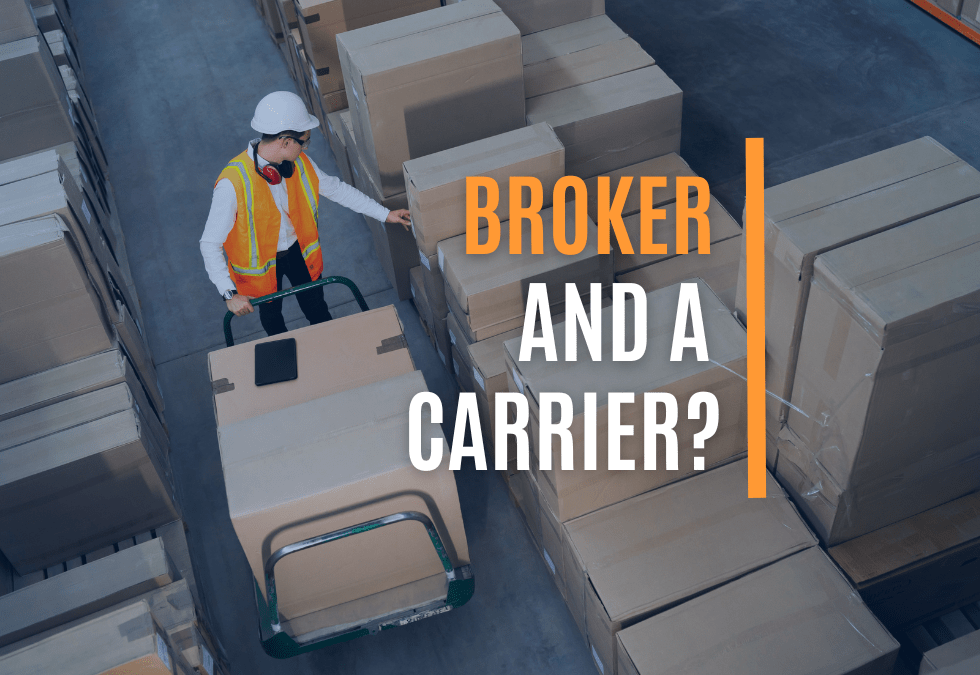Let’s be honest. You want to increase profits and see your bottom line grow. What can you do to expand your existing freight business?
Whether you are a freight broker who wants to be a motor carrier or you are a carrier who also wants to start a freight brokerage, you’re in the right place. Let’s look into what is involved with each of these businesses as well as explore if you can do both at the same time.
What Is a Freight Brokerage?
A freight brokerage is a transportation intermediary between shippers and carriers. It is responsible for invoicing shippers, paying carriers, extending credit, recruiting and paying agents, and assisting with claims and collections.
As a brokerage, the freight broker must obtain Federal Motor Carrier Safety Administration (FMCSA) property broker authority in order to arrange transportation between shippers and carriers.
A freight brokerage can hire or contract freight agents. Freight agents are not required to obtain FMSCA authority, but must arrange transportation services under the authority of a broker or carrier. An agent may act as an employee or as an independent contractor.
Freight Broker vs. Carrier
A motor carrier is legally authorized to transport freight from one place to another. This legal authorization is called FMCSA motor carrier authority. A carrier must obtain it in order to offer their hauling services “for hire” to the public.
The FMCSA does not often grant both property brokerage authority and motor carrier authority to a single operating company.
Therefore, a business owner generally sets up two different operating companies to offer both brokerage and carrier services for hire.
Can a Trucking Company Broker Loads?
While it is uncommon, yes, a trucking company can broker loads if it possesses both FMSCA motor carrier and property brokerage authority. Trucking companies that possess both authorities are a one-stop shop for customers.
At Kopf Leasing, Inc. we are unique in that we have both motor carrier and property brokerage authorities. We started as one man and his truck, and over time grew into three terminals, a large fleet of equipment, and added property brokerage to our mix of services.
Can a Freight Broker Own Trucks?
Yes, a freight broker or brokerage can own equipment. However, without motor carrier authority it cannot legally operate on U.S. roads.
There are many considerations to becoming both a broker and a carrier.
For instance, a freight broker can benefit financially by leasing its owned equipment to a carrier with motor carrier authority. The motor carrier will dispatch the equipment on loads, negotiate with the broker to lease or hire the driver, and pay the broker a percentage of revenue for the use of the equipment.
A Great Alternative
If you are exploring a profitable career in logistics, you may want to focus on being a freight agent.
The difference between a freight broker and a freight agent is tied to financial backing and risk tolerance. As mentioned earlier, freight brokers are licensed, insured, bonded and responsible for all credit risks and financial performance of the company.
In contrast, freight agents work under the authority of a licensed freight broker and earn a commission on each freight shipment arranged. Their focus is sales, customer service, and logistics. One of the benefits of being a freight agent is the unlimited earning potential.
Final Thoughts
So, can you be a freight broker and a carrier? In sum, yes. While it is rare, if you have the proper FMSCA authorities you can. Should you? Maybe not. They are two entirely different businesses and require substantial time, staff, and capital to manage both. If that leaves you a bit hesitant, you may want to consider becoming a freight agent instead.
Whatever business venture you move toward next, we’re cheering you on!
If you are interested in becoming an Independent Freight Agent for Kopf, get recruited! Apply here or give us a call at 574.349.5600.

